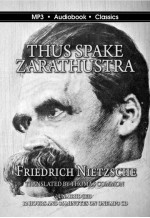Friedrich Nietzsche
|
Friedrich Wilhelm Nietzsche
(October 15, 1844 – August 25, 1900) was a German philologist,
philosopher, cultural critic, poet and composer. He is best known for
several works that articulate his call for a radical rethinking of the
nature of man, truth and philosophy: Thus Spake Zarathustra, Beyond Good and Evil, The Genealogy of Morals, and The Anti-Christ. The expressions “God is dead” and “the will to power” derive directly from his work. |
Beyond Good and Evil
Beyond Good and Evil: Prelude to a Philosophy of the Future is the second of four seminal late perio..
$9.99
On the Genealogy of Morals
Friedrich Nietzsche set out to dig into “the origin of our moral prejudices” in On the Genealogy of ..
$9.99
The Antichrist
The German title of The Antichrist, Der Antst, translates into English as “The Anti-Christian” as we..
$9.99
Thus Spake Zarathustra
“God is Dead”. “The Superman”. The “will to power”. We’ve all heard the phrases, which a..
$11.99





